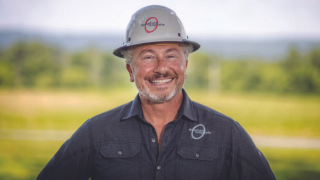|
How do you convince Europe's leading carriers that rolling out FTTH is a financially attractive proposition?
Over the last five years, the director general of the European FTTH Council, Professor Hartwig Tauber, has dedicated a great deal of time and effort trying to do just that. Before coming to the logical conclusion that perhaps you simply don't have to.
In February of this year, the European FTTH Council hosted its first Investors Day in London, which targeted key investors, project owners, regulators and policy makers.
"During the preparation for this event, we realised that there are enough investors interested in investing fibre networks," says Professor Tauber. "The reason behind this is that these fibre networks are now viewed as infrastructure, and therefore seen as a long-term secure investment."
Interest from the private equity sector is becoming so large, that some groups such as Macquarie have launched dedicated departments specially focusing on fibre projects.
Big financing for small projects
Whereas the roll-out of FTTH was once viewed primarily as the responsibility of incumbents, today the growing interest of private equity groups has paved the way for alternative providers to step up to the task of accelerating FTTH deployment.
And it is a task that needs addressing with some level of urgency. Europe as a region now lags someway behind Asia-Pacific on the global FTTH rankings, where the likes of South Korea, Hong Kong and Japan stand head and shoulders above the competition due to much greater state intervention.
Tauber and his colleagues at the European FTTH Council have had to be far more creative with their approach to encourage FTTH deployment in Europe: "The problem in Europe is often the alternative operators want to make local investments of between €30-50 million, but the institutional investors are examining projects more in the scale of €200 million upwards. So there is a mismatch in the size of projects and of course the smaller projects don't know how to approach the big investors," says Tauber. "This is why we thought we need to bring them together and show them how it can work."
At its Investor Day, the FTTH Council Europe showed off several new and successful business models for alternative operators to raise funding.
Take Investitionsbank Schleswig-Holstein in Germany. The local investment bank indentified six projects in the northern region of Germany, and aggregated the financing of them while the implementation remained independent. "We see one of our tasks as raising the profile of these examples," he says.
There is a widening and well documented disparity between FTTH roll-outs across Europe. Whereas Lithuania had claimed fifth spot in the global FTTH rankings (according to a report in October 2012), the UK, one of Europe's more obvious financial powerhouses, is nowhere to be seen.
Problems can occur, says Tauber, when governments lean back and rely on incumbents too heavily to meet broadband targets. Success stories across the continent tend to come from nations more willing to explore alternative options.
"In countries such as Sweden, Finland and Norway where the governments kept the markets more open, FTTH deployment happened in a completely different way. You have a lot of regional networks, a lot of municipality networks and a lot of cooperation between the incumbent and these projects."
Empowering rural communities
Tauber was born in a rural area close to the Czech border in Austria. Experiencing firsthand the social and economic changes that came to his local area when the border between the two nations was opened in 1989, he has since been a strong believer in stimulating local economy.
"I worked in rural development for several years and learned that availability of telecoms is a key success factor for rural regions. It might not be possible to build a four-lane highway or superfast railway to every small town - but it is possible to bring superfast broadband to every household."
Virtually unlimited bandwidth makes FTTH connections the most obvious, if not the only, possible means of handling projected consumer demand over the next decade. The FTTH Council Europe believes that delivering unlimited speeds to consumers and businesses empowers the development of a flow of new services and content that enhances the quality of life, contributes to a better environment and increased competitiveness.
Tauber is fascinated by the potential of the M2M sector, and in the long-term sees FTTH growth supporting these types of services. "I am a strong believer that robots and automation will have an enormous impact on our life in the next 10 years," says Tauber.
"Autonomous cars, robots and devices that care for elderly people, intelligent home appliances - they all exist today already and they are just waiting to get into the mass market. The ironic thing is that most of those solutions require fast and high quality broadband connections - therefore we are paving the way and putting the groundwork in place with our work in the FTTH Council Europe."
Yet Tauber admits the FTTH Council Europe still faces a huge challenge in convincing key decision makers and operators why end users actually need fibre. "One of the favourite arguments from incumbents in particular is that there is no demand for fibre. Our latest study, looking at operators that have been in the fibre market for more than three years, shows that they have all reached at least 30% take up rates and even more. It is a fact that there is demand for fibre-to-the-home."
Tauber also doesn't think the ongoing euro zone crisis is a particularly valid excuse for not investing in FTTH. "Let's put it this way, fibre investment could even be a way out of the crisis," he says frankly. "This is based on two things. First the deployment itself brings employment and second having a strong broadband fibre network in place means that you have a basis for further development of the economy."
Indeed the case for enhanced broadband availability contributing to economic growth is becoming stronger by the day. Tauber points to Portugal, where the economy is slowly turning itself back around: "It's interesting to see countries like Portugal which have really built on their broadband growth in the last few years. The country has a lot of activities centred on broadband services – for example, developing new smart grids and smart metering," he says.
Keeping up with the leapfrogging economies
There are a total of five FTTH councils set up worldwide to help support the deployment of fibre networks, covering Europe, Asia-Pacific, MENA, Africa and the Americas respectively.
This provides the FTTH Council Europe with a strong overview of the global FTTH scene. It is widely expected that countries presently lacking critical infrastructure will be able to bypass copper and go straight to deploying fibre, potentially leapfrogging roll outs in western markets.
"There is huge fibre investments planned in countries like Argentina and Brazil in the coming years. They need to build infrastructure and it wouldn't make sense to put copper in the ground so they go immediately to fibre," says Tauber.
Despite having no FTTH council representation, Russia has become another unexpected example of a nation that is leapfrogging Europe's FTTH deployment. "Russia has more fibre subscribers to date than the whole of Europe, and they started much later than we did," he says.
This has piled further pressure on Europe. Indeed the speed of FTTH deployment in countries such as Brazil and Russia could be so rapid that it might even force the region to revaluate its 2020 broadband targets.
"This could make a big difference and it is really important we do not weaken the agenda targets. I can tell you this is something we are really fighting for in Brussels at the moment," he says.




